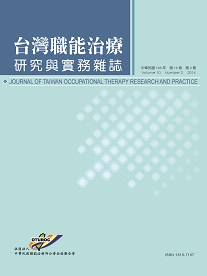Journal of Taiwan Occupational Therapy Research and Practice

半年刊,正常發行
前言:過去國內對老化態度研究偏重於不同年齡層對老年人的態度為研究對象,缺少從老年人自身對老化態度的研究。且有關老年人老化態度與心理健康之相關性研究非常有限,使我們對老年人老化態度與心理健康之相關性了解依舊不足。目的:主要目的在探討老年人老化態度與心理健康之相關性。方法:採用橫斷式研究設計,針對社區老年人以結構式問卷,方便取樣進行資料蒐集。本研究問卷採用自陳量表,量表分成三部分:( 一 )背景變項資料、( 二 ) 老化態度問卷量表、( 三 ) 台灣版自覺健康量表 (SF-36) 中之心理健康分量表與活力指數分量表。參與者來自台中市某區 65 歲以上老年人。統計方式主要使用多元回歸分析來檢驗老化態度與心理健康之相關性。結果:本研究參與者共有 187 名,男性 98 位與女性 89 位,平均年齡 74.1 ± 6.8 歲。在校正人口學變項下,老化態度總分與心理健康總分 (β = .39, < .01) 有顯著正相關;老化態度總分與活力指數總分 (β = .42, < .01) 有顯著正相關。換言之,老化態度對心理健康的二個面向「心理健康」與「活力指數」皆有顯著的正相關。結論:本研究結果顯示老化態度與心理健康、活力指數有顯著正相關。因此建立老年人有正向的老化態度是值得重視的議題。受限於本研究設計,建議未來研究可進一步探討老化態度與上述變項之因果關係。
Introduction: In the past, domestic research on aging attitudes focused on the attitudes of different age groups towards the elderly, and there was a lack of research on the attitudes of the elderly towards aging. In addition, the research on the correlation between aging attitudes and mental health of the elderly is very limited, so that we still have insufficient understanding of the correlation between attitudes about aging and mental health of the elderly. Purpose: The main purpose of study was to explore the correlation between attitudes about aging and mental health of the elderly. Methods: A cross-sectional research design was adopted, and a structured questionnaire was used for the elderly in the community to facilitate sampling for data collection. The structured questionnaire in this study was a self-reporting scale, which was divided into three parts: (1) background variable data, (2) aging attitude questionnaire, and (3) mental health subscale in the Taiwanese version of the 36-Item Short-Form Health Survey (SF-36), and the vitality index subscale. Participants were from a district in Taichung City over 65 years old. Statistical methods mainly used the multiple regression analysis to examine the correlation between attitudes about aging and mental health. Results: There were 187 participants in this study, 98 males and 89 females, with an average age of 74.1 ± 6.8 years. Under the adjusted demographic changes, the total score of aging attitude and the total score of mental health (β = .39, < .01) were significantly positively correlated; the total score of aging attitude and the total score of vitality index (β = .42, < .01) had a significant positive correlation. In other words, aging attitudes are significantly positively correlated with the two aspects of mental health, “mental health” and “vitality index”. Conclusion: The results of this study show that there was a significant positive correlation between aging attitude and mental health and vitality index. In other words, the more positive the aging attitude is, the more positive the mental health and vitality index is. Therefore, the establishment of a positive attitude towards aging among the elderly is an issue worthy of attention. Limited by the design of this study, it is suggested that future studies can further explore the causal relationship between aging attitudes and the above variables.












